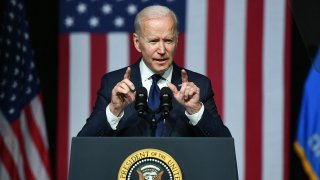
- President Joe Biden announced new measures on Tuesday that his administration will take to help narrow the racial wealth gap in America.
- The White House will roll back two Trump-era housing rules, increase the share of federal contracts for small, disadvantaged businesses and launch an initiative to address inequity in home appraisals.
- Biden delivered a powerful speech in Tulsa, Oklahoma to commemorate the 100th anniversary of the Tulsa race massacre.
WASHINGTON — President Joe Biden announced new measures his administration is taking to narrow the racial wealth gap on Tuesday, during a speech in Tulsa, Oklahoma.
The president visited Tulsa to commemorate the 100th anniversary of the Tulsa race massacre, one of the worst episodes of racial violence in U.S. history.
"I come here to help fill the silence. Because in silence, wounds deepen," Biden said in a memorable speech on the dark legacy of violent racism and white supremacy in America. "As painful as it is, only in remembrance do wounds heal," he said. "We simply can't bury pain and trauma forever."
Get top local stories in Southern California delivered to you every morning. >Sign up for NBC LA's News Headlines newsletter.
On May 31, 1921, white supremacists attacked Tulsa's Greenwood neighborhood, one of the wealthiest Black communities in America at the time. Countless Black people were killed — estimates ranged from 55 to more than 300 — and 1,000 homes and businesses were looted and set on fire in what remains one of the worst incidents of racial violence in American history.
In the century since the Tulsa massacre, Black Americans have been subjected to discrimination across the U.S. economy, in housing, banking and employment.
Money Report
The median net worth of white households today is approximately eight times as much as the net worth of Black households, a racial wealth gap that grew wider during the Covid pandemic.
Biden campaigned for president on a pledge to address systemic racism and opportunity gaps in all aspects of American life.
"Shockingly, the percentage of black American home ownership is lower today than it was 50 years ago, and that's wrong and we're committed to changing that," the president said on Tuesday.
Biden focused on expanding equity and access to two key wealth generators for Americans: home ownership and small business ownership. As part of this, he announced:
- The creation of an interagency initiative to address inequity in home appraisals, led by Secretary of Housing and Urban Development Marcia Fudge.
- Two new Fair Housing Act rules that reverse efforts by HUD during the Trump administration to weaken protections afforded by the law.
- A goal of increasing the share of federal contracts awarded to small, disadvantaged businesses by 50% over the next five years. Currently, around 10% of federal contracts go to SDBs annually, totaling around $50 billion.
Notably absent from Biden's remarks were any concrete actions on two issues at the heart of the debate over how to advance racial equity in the U.S. economy: student loan debt forgiveness and reparations for slavery.
As a candidate, Biden pledged to use federal powers to cancel thousands of dollars of debt for every student in America. But so far, his administration has not produced a plan or a timeline for how to implement debt forgiveness.
Some economists estimate that student loan debt explains as much as a quarter of the racial wealth gap between Black and white people ages 30-35.
Another topic Biden avoided was the question of reparations, despite a campaign underway in Tulsa to compensate the last living survivors of the 1921 race massacre.
Biden said that his signature, $2 trillion infrastructure proposal, the American Jobs Plan, could help to narrow the racial wealth gap. "It's about good paying jobs, financial stability and being able to build some generational wealth. It's about economic growth for our country and outcompeting the rest world which is now outcompeting us," he said.
Infrastructure, said Biden, is about much more than roads.
"Instead of just talking about infrastructure, let's talk about the action of rebuilding roads and highways, filling the sidewalks and cracks, installing street lights and high speed internet and creating places to work and play safely," he said.
"Access to health care, clean air and clean water, nearby grocery stores stocked with fresh vegetables and food, I mean, these are all things we can do."
According to the White House, there are several proposals in the American Jobs Plan that could specifically address the racial wealth gap. These include a New Neighborhood Homes Tax Credit, which would offer a tax credit to investors who renovate houses in low-income and blighted areas, where properties often cost more to redevelop than they can sell for.
Another measure that could help shrink the gap is a $15 billion fund for a Reconnecting Neighborhoods Program, which would provide grants to help remove or reconfigure highways that cut through the middle of downtowns in midsize U.S. cities.
But these initiatives are still in the planning phase. The American Jobs Plan has yet to be taken up by Congress as legislation, let alone passed into law. And with only a one-seat majority in the Senate, Democrats have few avenues by which to pass legislation without Republican votes.
The White House has spent the last three weeks negotiating with a group of Senate Republicans in an effort to create a bipartisan infrastructure bill that could pass with majorities in both chambers.
But those talks have stalled, and Biden has come under increasing pressure in the past week to abandon them.
Democrats are increasingly focused on trying to enact the president's domestic agenda using a budget reconciliation bill, a complex legislative maneuver that requires only 51 votes in the Senate.






